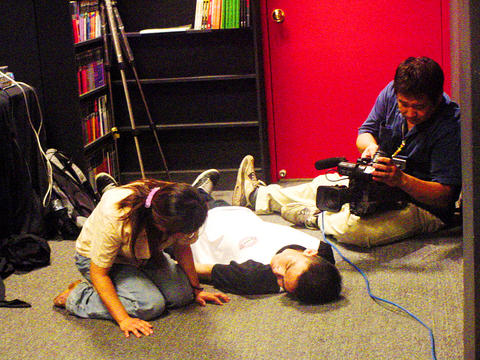To many of us, the world of filmmaking may seem as unfathomable as life forms on Mars and the profession's jargon undecipherable. Now, there is an opportunity for even the uninitiated to show off their creativity through the camera lens. The Film Arts Institute (影藝學苑, FAI) in Ximending (西門町) has held a broad selection of evening and weekend courses covering scriptwriting, filmmaking, acting, marketing and film festival management, for the past three years. The fall session begins tomorrow night with eight hands-on training courses.
Past guest instructors include filmmaker Chang Tso-chi (張作驥), film critic Wen Tien-hsiang (聞天祥), Golden Horse winning cinematographer Liao Pen-jung (廖本榕) and veteran film buyer Patrick Huang (黃茂昌) to name a few. Many more are scheduled to participate in the institute's upcoming schedule, which aims to expand the local film industry's talent pool.
The fall program's topics include storyboards, cinematography, film editing and sound recording will be covered to enable students to complete films by themselves. The behind-the-scenes reality of independent filmmaking will be revealed by producers of recent box-office hits such as The Heirloom (宅變), Do Over (一年之初) and Exit No. 6 (六號出口) .

Photo: courtesy of The Film Arts Institute
Tian Kai-leong (田開良), the scriptwriter of award-winning After This Our Exile (父子), will deliver a lecture on how to translate creative ideas into a filmable script. Taking students into the distribution side of the industry, managers from Group Power Workshop (群體娛樂), Swallow Wings Film (海鵬影業) and 20th Century Fox, Taiwan will share their marketing strategies with students, while directors Chen Huai-en (陳懷恩), Cheng Wen-tang (鄭文堂) and Chu Yu-ning (瞿友寧) will discus how to tell a good story through the lens.
FAI is located at 3F, 89, Wuchang St Sec 2, Taipei (台北市武昌街二段89號3樓). All classes are in Mandarin. For more information, visit the institute's Web site at www.filmarts.org.tw or call (02) 2370-9474.

April 28 to May 4 During the Japanese colonial era, a city’s “first” high school typically served Japanese students, while Taiwanese attended the “second” high school. Only in Taichung was this reversed. That’s because when Taichung First High School opened its doors on May 1, 1915 to serve Taiwanese students who were previously barred from secondary education, it was the only high school in town. Former principal Hideo Azukisawa threatened to quit when the government in 1922 attempted to transfer the “first” designation to a new local high school for Japanese students, leading to this unusual situation. Prior to the Taichung First

The Ministry of Education last month proposed a nationwide ban on mobile devices in schools, aiming to curb concerns over student phone addiction. Under the revised regulation, which will take effect in August, teachers and schools will be required to collect mobile devices — including phones, laptops and wearables devices — for safekeeping during school hours, unless they are being used for educational purposes. For Chang Fong-ching (張鳳琴), the ban will have a positive impact. “It’s a good move,” says the professor in the department of

On April 17, Chinese Nationalist Party (KMT) Chairman Eric Chu (朱立倫) launched a bold campaign to revive and revitalize the KMT base by calling for an impromptu rally at the Taipei prosecutor’s offices to protest recent arrests of KMT recall campaigners over allegations of forgery and fraud involving signatures of dead voters. The protest had no time to apply for permits and was illegal, but that played into the sense of opposition grievance at alleged weaponization of the judiciary by the Democratic Progressive Party (DPP) to “annihilate” the opposition parties. Blamed for faltering recall campaigns and faced with a KMT chair

Article 2 of the Additional Articles of the Constitution of the Republic of China (中華民國憲法增修條文) stipulates that upon a vote of no confidence in the premier, the president can dissolve the legislature within 10 days. If the legislature is dissolved, a new legislative election must be held within 60 days, and the legislators’ terms will then be reckoned from that election. Two weeks ago Taipei Mayor Chiang Wan-an (蔣萬安) of the Chinese Nationalist Party (KMT) proposed that the legislature hold a vote of no confidence in the premier and dare the president to dissolve the legislature. The legislature is currently controlled